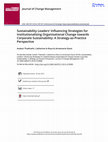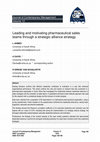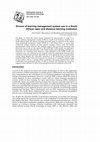Papers by Annemarie Davis

The factors that contribute to postgraduate business student performance and success within an op... more The factors that contribute to postgraduate business student performance and success within an open and distance learning (ODL) environment were investigated. An exploratory research approach was followed in three stages: a structured questionnaire, semi-structured qualitative interviews and a secondary document analysis of the student records. The contributing factors were identified to inform future teaching practices in ODL that may lead to an improvement in student performance, course pass rates and ultimately the throughput rate of qualifications. The contributing factors in this context pertain to formative assessment, student enjoyment of the course, lecturer involvement and attendance of course workshops. Students highly value proactive contact from lecturers in the form of text messages and email communications. Recommendations include a reconsideration of the assessment practices-in particular, the weighting of the contribution of assignments towards the final mark. Offering regular face-to-face sessions with the studentsalbeit with lecturers or appointed tutors-is recommended. The influence of regular lecturer contact and face-to-face workshops is particularly interesting, considering that the research was conducted at an ODL institution. Additional questions on student learning styles arise regarding the students' fit with ODL, course design and teaching practices in ODL. This could lead to further research in the South African higher education environment.

International Journal of Management, Knowledge and Learning
Purpose: The lived experiences of middle managers within the messy realities of change offer valu... more Purpose: The lived experiences of middle managers within the messy realities of change offer valuable insight into how middle managers deal with disruptions. The purpose of this research was to explore the lived experiences of middle managers within the messy realities of strategising during organisational change. Study design/methodology/approach: Using a qualitative, intrinsic, single-case study grounded in Weick’s sense-making theory, the sense-making practices of middle managers during organisational change were explored. Data was gathered through email journals over four months and enabled real-time tracking of microlevel strategising after change implementation. A constructionist form of thematic analysis was adopted and explored middle managers’ organisational social reality. Findings: Sense-making occurs on a cognitive and emotional level. Participants attached meaning to actions and thereby created a sense for themselves and others towards organisational security and sustai...

Industry and Higher Education
This paper presents the findings from a study on the dynamic and nuanced relationship between str... more This paper presents the findings from a study on the dynamic and nuanced relationship between strategy theory and strategy practice in a South African context. Grounded in a strategy-as-practice perspective and based on an abductive analysis of sixteen semi-structured interviews, the empirical findings deepen our conceptual understanding of how the relationship between strategy theory and strategy practice is constituted. The findings further reveal how practice environments influence the effective use of academic knowledge and skills by graduates in the workplace. Primarily, strategy theory is foundational to effective strategy practice. We theorise that strategy practitioners construct the relevance of strategy theory through adaptation and bricolage to suit complex and eclectic practice contexts. The study findings confirm that strategy theory plays a critical role in shaping and guiding strategy practitioners’ praxis. As the ontic sites of knowledge and skills application, pract...

This study set out to explore the strategising practices of middle managers and thereby expand th... more This study set out to explore the strategising practices of middle managers and thereby expand the body of knowledge in terms of middle management practices in strategising in general, and makes an original contribution at the frontiers of middle management practices in a university context in South Africa. Although some research has been done on middle managers and strategy, a knowledge gap still exists, especially regarding strategising in emerging economies, such as South Africa. More specifically, the actions of middle managers at universities are open for exploration. Universities are increasingly exposed to new challenges in a competitive environment due to declining state funding, changing student demographics, new technological developments and increased market pressures. The sustainability of universities is also threatened by changes inside the universities, such as the drive for corporatisation and a changing internal focus. The way universities respond to and preempt dealing with these challenges will influence the sustainability and competitiveness of the university and subsequently the nations it serves. However, very little is known about the university managers who are powerful in terms of the administrative systems and decision processes. In order to understand strategy work TABLE OF CONTENTS Contents
The study investigated South African dairy consumers' emotive reactions associated with seven... more The study investigated South African dairy consumers' emotive reactions associated with seven generic communication messages. Based on the findings of the study, the authors made recommendations on the three messages with the highest potential to engage consumers in a national dairy marketing campaign. The participants consisted of 81 South African dairy consumers from different backgrounds in terms of age, race and gender. Data were collected in the Gauteng Province using Computer-Aided Web Interviewing (CAWI). The Advertisement Self-Assessment Manikin (AdSAM), a non-verbal measure of emotions grounded in the Pleasure, Arousal and Dominance theory was used to analyse the data. The findings revealed that certain messages are more conducive to emotive reactions. When advertisements are emotionally-charged, their potential to engage consumers is higher.

Journal of Change Management, 2019
Through deductively applying the influencing strategies component of the institutionalizing chang... more Through deductively applying the influencing strategies component of the institutionalizing change model, the article sets out to discover what sustainability leaders do to create a readiness for and reinforcing the institutionalization of relatively large-scale organizational change towards corporate sustainability. This study used the influencing strategies component of the institutionalizing change model as a framework in order to uncover the pragmatic change practices of a group of sustainability leaders in a multi-level organization with several subsidiaries. This article argues that to realize meaningful organizational change, it is important to know the 'pragmatic practices' underpinning the 'theoretical what'. The research drew on the qualitative case study method to realize this endeavour. The study found that all seven influencing strategies identified in the literature were in use and so confirmed their value for change management theory and practice. Findings also showed the unique socially situated practices underlying each influencing strategy. The study concluded that the seven influencing strategies are potentially applicable and of value to other organizations although change agents may deploy these strategies differently as is appropriate for the change agenda in their organization.

The factors that contribute to postgraduate business student performance and success within an op... more The factors that contribute to postgraduate business student performance and success within an open and distance learning (ODL) environment were investigated. An exploratory research approach was followed in three stages: a structured questionnaire, semi-structured qualitative interviews and a secondary document analysis of the student records. The contributing factors were identified to inform future teaching practices in ODL that may lead to an improvement in student performance, course pass rates and ultimately the throughput rate of qualifications. The contributing factors in this context pertain to formative assessment, student enjoyment of the course, lecturer involvement and attendance of course workshops. Students highly value proactive contact from lecturers in the form of text messages and email communications. Recommendations include a reconsideration of the assessment practices-in particular, the weighting of the contribution of assignments towards the final mark. Offering regular face-to-face sessions with the studentsalbeit with lecturers or appointed tutors-is recommended. The influence of regular lecturer contact and face-to-face workshops is particularly interesting, considering that the research was conducted at an ODL institution. Additional questions on student learning styles arise regarding the students' fit with ODL, course design and teaching practices in ODL. This could lead to further research in the South African higher education environment.
Managers in various industries and from organisations of various sizes generally agree that a wel... more Managers in various industries and from organisations of various sizes generally agree that a well devised strategy (often described, devised and implemented under another name such as a business plan) is essential for business success.

This study set out to explore the strategising practices of middle managers and thereby expand th... more This study set out to explore the strategising practices of middle managers and thereby expand the body of knowledge in terms of middle management practices in strategising in general, and makes an original contribution at the frontiers of middle management practices in a university context in South Africa. Although some research has been done on middle managers and strategy, a knowledge gap still exists, especially regarding strategising in emerging economies, such as South Africa. More specifically, the actions of middle managers at universities are open for exploration. Universities are increasingly exposed to new challenges in a competitive environment due to declining state funding, changing student demographics, new technological developments and increased market pressures. The sustainability of universities is also threatened by changes inside the universities, such as the drive for corporatisation and a changing internal focus. The way universities respond to and preempt dealing with these challenges will influence the sustainability and competitiveness of the university and subsequently the nations it serves. However, very little is known about the university managers who are powerful in terms of the administrative systems and decision processes. In order to understand strategy work TABLE OF CONTENTS Contents

Acta Commercii, 2020
Whilst research on middle managers has increased considerably, research on the role of middle man... more Whilst research on middle managers has increased considerably, research on the role of middle managers in the public sector context remains a rich context for exploring strategising. Research purpose: The purpose of this research was to explore the strategising roles of middle managers in the public sector through the strategy-as-practice perspective. Motivation for the study: The article responds to calls for research using the strategy-aspractice perspective to explore the role of middle managers in the public sector. Research design, approach and method: The research adopted a qualitative exploratory case study design. The data was gathered using semi-structured interviews conducted with 14 middle managers at a selected government department. Main findings: The research findings confirm that the strategising roles of middle managers in the public sector comprise of three key roles: sense-making and sense-giving role, the implementation role and monitoring and evaluation role. Within the public sector context, strategies are mostly deliberate and driven from national plans. When middle managers `receive' these strategies, they make sense of it and then communicate the strategy to their subordinates through their own interpretations involving both horizontal and vertical communication channels. Practical/managerial implications: The findings confirm benefits for involving middle managers in the crafting of high-level strategy in government departments which may lead to them owning the strategy and implementation thereof. Contribution/value-add: The research adds value by confirming the middle managers' strategising roles within the chosen government department and identifying how changes to their roles can enhance strategising.

Australasian Journal of Educational Technology
The study on which this article reports examined the determinants of usage of an online learning ... more The study on which this article reports examined the determinants of usage of an online learning management system (LMS) by fourth level business students at a South African open and distance learning university using an extension of the widely used technology acceptance model (TAM) as a theoretical basis. A survey was conducted among students at their annual summer school, with 213 usable questionnaires being returned. The findings suggest that perceived usefulness and perceived ease of use as core aspects of the TAM and TAM2 models are confirmed, and study relevance (job relevance in the TAM2 model) and facilitating conditions as extensions are confirmed also. However, other elements of the TAM2 model and extensions were not confirmed by the research, while the relationships between these constructs, behavioural intention and LMS use were significant but not particularly strong. Thus, despite the ostensible robustness of the underlying structure and dimensionality of the TAM core ...

As a third of all directors in South Africa are chartered accountants (CAs), this research examin... more As a third of all directors in South Africa are chartered accountants (CAs), this research examined the strategising practices of CA strategists in the mining industry. Drawing on the strategy-as-practice perspective, the research aimed to answer questions pertaining to which strategy tools CA strategists use, and how their accounting background informs their decisions on which tools to use and how to use them. Empirical data were produced through semi-structured individual interviews with CA strategists selected through purposive and snowball sampling. Data were analysed through conversation analysis using thematic coding. Findings portray CA strategists as craftspeople who adapt and interpret strategy tools from an accounting perspective to serve the requirements of the situation they face. The research confirmed wide use of accounting tools in strategising. The research found that the model of strategising, albeit deliberate or emergent, as well as the educational background of t...

Journal of Contemporary Management, 2011
In recent years, higher education institutions in South Africa and, more specifically, private hi... more In recent years, higher education institutions in South Africa and, more specifically, private higher education institutions, have faced increasing pressures on many fronts. These pressures include increased competition, changing technology and greater emphasis on efficient and effective management. The aim of this article is to report on the findings of a study that investigated the impact of leadership practices on service quality in private higher education (PHE) in South Africa as a source of competitive advantage. Literature suggests that leadership impacts positively on quality and, equally importantly, on service quality. Principals at these PHE institutions have a notable influence on the quality of service rendered to the students. Using a quantitative methodology and a cross-sectional survey research design, the study was conducted on five campuses of a prominent PHE provider across South Africa. Two survey instruments were used, namely the Leadership Practices Inventory q...

Journal of Contemporary Management, 2016
Existing literature confirms that effective leadership contributes to motivation in a way that en... more Existing literature confirms that effective leadership contributes to motivation in a way that enhances organisational performance. This article confirms this view and reports on research that was conducted in a pharmaceutical organisation in South Africa that investigated the relationship between leadership behaviour of sales managers and the motivation of sales teams. A quantitative dominant mixed methods approach was used for this research with a correlational design and the inclusion of content analysis. Data were collected from a population of 60 respondents in a multinational pharmaceutical organisation, using a survey questionnaire. Factor analysis on the questionnaire confirmed four leadership behaviours, namely team, supportive, autocratic and directive leadership. The findings showed that Pearson's correlation coefficient (r) for autocratic leadership and motivation was the highest with an r-value of 0.574, indicating that during the implementation of a strategic allia...

The purpose of this study was to explore the strategising practices of chartered accountants (CAs... more The purpose of this study was to explore the strategising practices of chartered accountants (CAs) in the South African mining industry. Few studies have dealt with the practical skills CAs employ when they engage in strategising practices and, in particular, a gap could be identified on how CAs engage with strategy tools during strategising. Approximately two thirds of all directors in South Africa are CAs and only 11% of directors who are CAs also hold master"s degrees in business administration. The question then arises of how do CAs engage with strategy tools during strategising? This study applied key concepts of social practice theory to explore the strategising practices of CAs from a strategy-as-practice perspective. The strategy-as-practice perspective entails studying strategy practitioners within their social constructs. The context of this study was the South African mining industry, a landscape seen as an essential part of the South African economy. An exploratory qualitative research design was applied whereby one-on-one interchanges during individual interviews provided rich, detailed descriptions of how CA strategists use strategy tools when they engage in strategising practices. The social nature of the practices and praxis of strategy practitioners from a strategy-aspractice perspective constantly changes. As such, the current study was conducted from a constructivist paradigm to describe the narrative reality of the strategy practitioners as they engage with strategy tools. The findings of the study portrayed participants as bricoleurs of strategy tools, i.e. craftspeople who adapted and interpreted strategy tools from an accounting perspective to serve the requirements of the situation they face. Key terms: chartered accountants; exploratory qualitative research; South African mining industry; strategising practices; strategy-as-practice perspective; strategy tools. v DECLARATION I, the undersigned, declare that this dissertation Strategising Practices of Chartered Accountants in the South African Mining Industry, is my own work, and that all the sources I have used or cited have been indicated and acknowledged by means of complete references.

Australasian Journal of Educational Technology, 2012
The study on which this article reports examined the determinants of usage of an online learning ... more The study on which this article reports examined the determinants of usage of an online learning management system (LMS) by fourth level business students at a South African open and distance learning university using an extension of the widely used technology acceptance model (TAM) as a theoretical basis. A survey was conducted among students at their annual summer school, with 213 usable questionnaires being returned. The findings suggest that perceived usefulness and perceived ease of use as core aspects of the TAM and TAM2 models are confirmed, and study relevance (job relevance in the TAM2 model) and facilitating conditions as extensions are confirmed also. However, other elements of the TAM2 model and extensions were not confirmed by the research, while the relationships between these constructs, behavioural intention and LMS use were significant but not particularly strong. Thus, despite the ostensible robustness of the underlying structure and dimensionality of the TAM core ...

Quality Assurance in Education, Jul 3, 2017
This article aims to identify what is needed to enhance academic quality assurance in a universit... more This article aims to identify what is needed to enhance academic quality assurance in a university, with specific efforts to reduce the risks associated with ritualised quality assurance practices. Design/methodology/approach Practical implications The aspects identified are particularly important for quality assurance practitioners, developers of quality assurance processes and academics at universities to enable enhancement of academic quality assurance practices. Originality/value This article argued that the nature of managerialism caused quality assurance to lose its meaning. The abundance of quality assurance tasks, forms and processes do not protect the institution against reputational risks, and quality assurance, as practiced today, was found to be intrinsically risky. This article offered an integrated view on how quality assurance efforts can be enhanced.
Journal of Management & Organization, 2014
In recognition of middle managers as influential strategists we collected 654 responses from Sout... more In recognition of middle managers as influential strategists we collected 654 responses from South African middle managers detailing their spontaneous and unguided descriptions of their strategic roles in the organisation they represent. The results show that middle managers generally associate their strategic role strongly with the traditional perspectives on the roles as implementers of strategies and communicators linking their subordinates and higher levels of management. We add the roles of 'advocacy' and 'improving operational performance' to the conventional elements of strategy implementation, and the roles of 'managing performance' and 'driving compliance' to the role of downward influence. Focus group discussions contextualised and authenticated these roles within the South African private and public sectors.

Studies in Higher Education, 2014
In an attempt to understand the effects of managerialism on university managers in a developing c... more In an attempt to understand the effects of managerialism on university managers in a developing country, we set out to gather rich data on the strategy work of middle managers through a single case study at a South African university. Managerialism has the potential to solve inefficiencies in university systems and processes, as it could help to simplify the complex university management environment. Yet, our findings show that middle managers at the chosen institution are constrained by the effects of managerialism. Managerialism has resulted in a tyranny of bureaucracy which translates into disempowered middle managers, a culture of conformance over collegiality, control at the cost of innovation and experimentation and an over-articulation of strategy which devalues the strategy. To cope with the identified negative effects of managerialism, middle managers create their own systems outside the bureaucracy and provide more support to peers and subordinates.

Australasian Journal of Educational Technology
The study on which this article reports examined the determinants of usage of an online learning ... more The study on which this article reports examined the determinants of usage of an online learning management system (LMS) by fourth level business students at a South African open and distance learning university using an extension of the widely used technology acceptance model (TAM) as a theoretical basis. A survey was conducted among students at their annual summer school, with 213 usable questionnaires being returned. The findings suggest that perceived usefulness and perceived ease of use as core aspects of the TAM and TAM2 models are confirmed, and study relevance (job relevance in the TAM2 model) and facilitating conditions as extensions are confirmed also. However, other elements of the TAM2 model and extensions were not confirmed by the research, while the relationships between these constructs, behavioural intention and LMS use were significant but not particularly strong. Thus, despite the ostensible robustness of the underlying structure and dimensionality of the TAM core ...










Uploads
Papers by Annemarie Davis